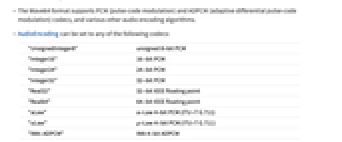Wave64 (.w64)
Wave64 (.w64)
Background & Context

-
- Sony Wave64 audio format.
- Promoted under the name Sony Pictures Digital Wave 64.
- Designed to overcome the 4 GB file size limit of the Microsoft WAV format.
- Binary file format.
- Similar to the Microsoft RIFF/WAV format.
- Typically stores uncompressed, sampled audio as pulse-code modulation (PCM) data.
- Also supports several codecs for compressed audio.
- Supports arbitrary sampling frequency, arbitrary number of channels, and arbitrary bit depth.
- Developed by Sonic Foundry, maintained by Sony.
Import & Export

- Import["file.w64"] imports a Wave64 file, returning an audio object.
- Import["file.w64",elem] imports the specified element from a Wave64 file.
- The import format can be specified with Import["file","Wave64"] or Import["file",{"Wave64",elem,…}].
- Export["file.w64",expr] exports an audio or sound object to a 16-bit Wave64 file.
- Sound objects including notes are rasterized to sampled audio.
- See the following reference pages for full general information:
-
Import, Export import from or export to a file CloudImport, CloudExport import from or export to a cloud object ImportString, ExportString import from or export to a string ImportByteArray, ExportByteArray import from or export to a byte array
Import Elements

- General Import elements:
-
"Elements" list of elements and options available in this file "Summary" summary of the file "Rules" list of rules for all available elements - Data representation elements:
-
"Audio" audio signal given as an Audio object "AudioFile" audio signal given as an out-of-core Audio object "Data" raw audio samples, given as a list of real numbers, each sublist representing an individual audio channel "SampledSoundList" audio signal given as a SampledSoundList object "Sound" audio signal given as a Sound object - Import and Export use the "Audio" element by default for Wave64 files.
- Advanced Import element:
-
"AudioChannels" number of audio channels "AudioEncoding" audio encoding "Duration" duration of the audio given in seconds "Length" number of samples "SampleDepth" number of bits used to store every sample "SampleRate" number of amplitude samples per second and channel
Options


- Import and Export option:
-
SampleRate Automatic number of amplitude samples per second for each channel - Detailed properties and settings:
-
"AudioChannels" Automatic the number of audio channels in the file AudioEncoding "Integer16" how samples are encoded - If the sample rate is not specified when exporting to Wave64, the highest sample rate occurring in the exported sound is used, and all sounds are resampled as necessary.
- If the number of channels is unspecified, the highest number of simultaneous channels is taken, and silence is inserted if necessary.
- If "AudioChannels" is set to a value n that is less than the number of channels to be exported, only the first n channels are exported.
- The Wave64 format supports PCM (pulse-code modulation) and ADPCM (adaptive differential pulse-code modulation) codecs, and various other audio encoding algorithms.
- AudioEncoding can be set to any of the following codecs:
-
"UnsignedInteger8" unsigned 8-bit PCM "Integer16" 16-bit PCM "Integer24" 24-bit PCM "Integer32" 32-bit PCM "Real32" 32-bit IEEE floating point "Real64" 64-bit IEEE floating point "aLaw" a-Law 4-bit PCM (ITU-T G.711) "uLaw" μ-Law 4-bit PCM (ITU-T G.711) "IMA-ADPCM" IMA 4-bit ADPCM "MS-ADPCM" Microsoft 4-bit ADPCM "GSM610" GSM 6.10 codec (ETSI 6.10 standard) - Not all codecs support arbitrary sample rates and channel specifications.
Examples
Basic Examples (1)
Use Play to generate sampled sound:
Related Guides
History
Introduced in 2007 (6.0) | Updated in 2016 (11.0)